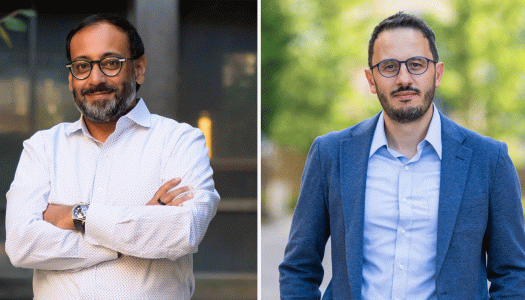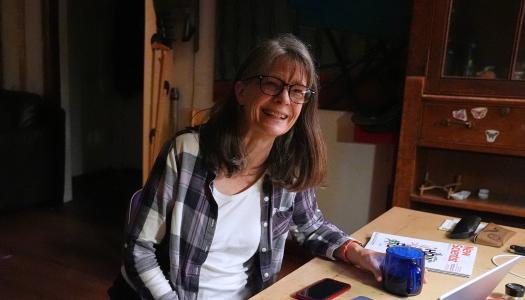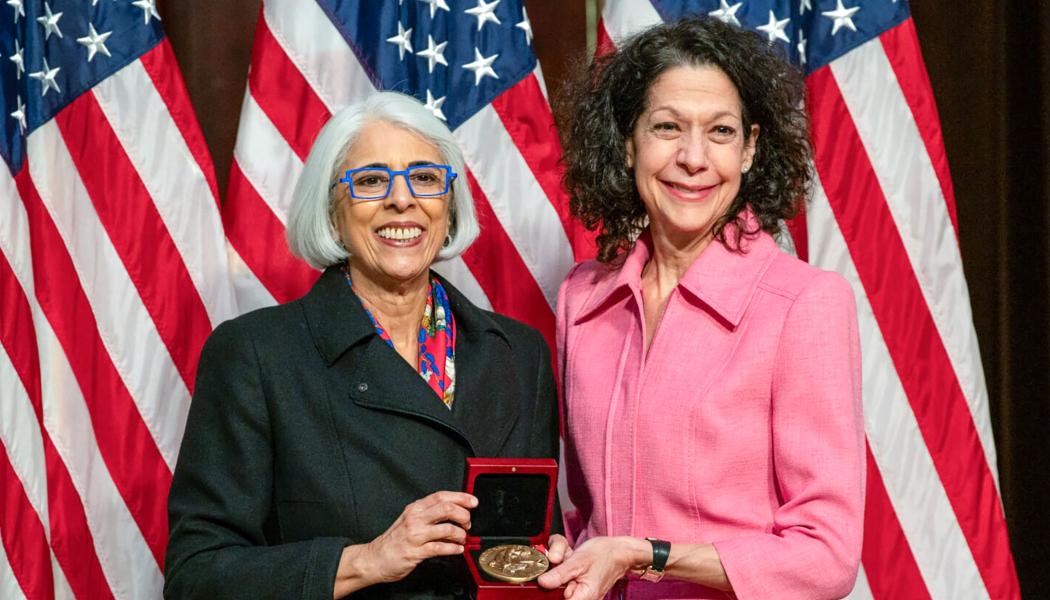
Princeton molecular biologist Bonnie Bassler (right) receives the National Medal of Science from Arati Prabhakar, director of the White House Office of Science and Technology Policy (OSTP) and assistant to the president for science and technology. Photo by Ryan K. Morris for the National Science & Technology Medals Foundation
Princeton molecular biologist Bonnie Bassler has received the National Medal of Science, the nation’s highest scientific honor. Two emeritus members of the Princeton faculty, Larry Martin Bartels and Ingrid Daubechies, and two undergraduate alumni, John Dabiri ’01 and Cynthia Dwork ’79, were also among this year’s 14 recipients of the White House honor, announced and awarded in a ceremony Jan. 3. The ceremony also honored nine individuals with National Medals of Technology and Innovation, the highest honor for technological achievement.
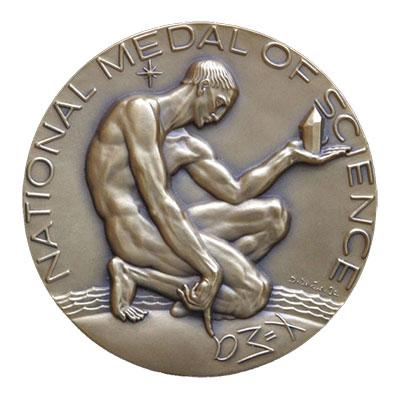
“Congratulations to those recipients of two of our nation’s most prestigious honors, the National Medal of Science and National Medal of Technology and Innovation,” said President Joseph Biden during the livestreamed ceremony. “This year’s honorees represent a simple truth: As I’ve always believed, America can be defined by a single word, ‘possibilities.’ That’s who we are, a nation of possibilities.”
“I couldn’t be more delighted for Bonnie and the other medalists from the Princeton family,” said Princeton President Christopher L. Eisgruber ’83. “Bonnie’s groundbreaking discoveries about bacterial messaging have revolutionized our concepts of what molecular communication can be and what a profound role it plays for all life-forms, from the simplest to the most complex.”
He continued, “All Princetonians, from our undergraduates through our senior faculty members, are encouraged to take intellectual risks, pursue radical new ideas, follow their curiosity — and as we see today, that can lead to astonishing accomplishments that fulfill our informal motto, Princeton ‘in the nation’s service and the service of humanity.’”
The ceremony was held in the Eisenhower Executive Office Building adjacent to the White House. Awards were presented by Arati Prabhakar, director of the White House Office of Science and Technology Policy (OSTP) and assistant to the president for science and technology.
Bonnie L. Bassler
Bassler received the National Medal of Science “for paving the way to develop novel therapies to combat bacteria,” according to the award citation read at the ceremony. “Spending years in laboratories while sparking the imaginations of students, Bonnie Bassler established bacteria as social organisms with a widespread signaling system for communicating. Her revolutionary research opens a gateway to solving biological puzzles that can save lives.”
From her early work confirming how bacteria act in concert, to her growing understanding of the extraordinary webs of microbial messaging among the tiniest life-forms, Bassler has been a pioneer and global leader in the understanding of how bacteria communicate with each other.
“I am delighted and honored to receive the National Medal of Science. I am very proud of and grateful to my lab team,” said Bassler, the Squibb Professor in Molecular Biology and the chair of the Department of Molecular Biology at Princeton University. “The festivities in D.C. were magical.
“Most moving and memorable to me were the speeches at the ceremony,” Bassler said. “They were not about a scientist being the best in a field, or the first to make a revolutionary finding, but rather, about the importance of the recipients’ research and mentorship of the next generations of scientists to democracy and to the vitality of and possibilities for the nation now and going forward.
“That is not how I think of myself or my work on a day-to-day basis,” she said. “It was both humbling and thrilling for my team’s work to be considered in that realm.”
Among her many honors, Bassler is a member of the National Academy of Sciences, the National Academy of Medicine, the American Academy of Arts and Sciences, and a fellow of the American Association for the Advancement of Science.
She is a Howard Hughes Medical Institute Investigator and a recipient of Princeton University’s President’s Award for Distinguished Teaching, the Wolf Prize in Chemistry, the Canada Gairdner International Award, the Princess of Asturias Award from the Spanish Crown, the Gruber Prize, the Albany Prize, the L’Oréal-UNESCO Women in Science Award and a MacArthur “genius grant.”
Bassler received her B.S. in biochemistry from the University of California-Davis and a Ph.D. in biochemistry from Johns Hopkins University.
Larry Martin Bartels
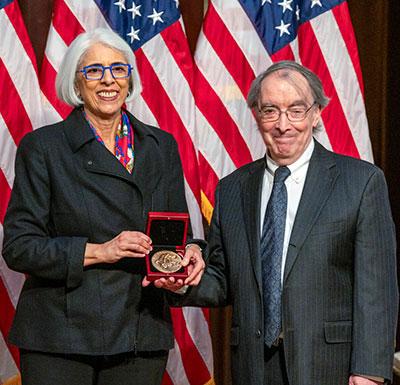
Bartels received the National Medal of Science “for thought leadership that promotes democracy around the world,” according to his award citation. “Larry Bartels’ study of democratic institutions and analyses of partisanship and voting behavior, economic inequality and political accountability offer astute insights that have shaped attitudes and call on all of us to protect our sacred democratic principles.”
Bartels, Princeton’s Donald E. Stokes Professor in Public and International Affairs, Emeritus, and an emeritus professor of politics, was on the Princeton faculty from 1991 to 2011. On Jan. 1, 2012, he transferred to emeritus status and joined the Department of Political Science at Vanderbilt University.
Bartels was the founding director of Princeton’s Center for the Study of Democratic Politics at the School of Public and International Affairs. The center supports empirical research into democratic political processes and institutions.
It is very rare for a social scientist like Bartels to win the National Medal of Science, noted Christopher Achen, Princeton’s Roger Williams Straus Professor of Social Sciences, Emeritus, and an emeritus professor of politics.
“Larry is widely regarded as the preeminent scholar of American representative democracy,” said Achen, who co-authored “Democracy for Realists” with Bartels in 2016. “He has an uncanny ability to use hard evidence to overturn cherished political pieties. A running theme in his work is that elites get their way far more than ordinary people do, even in democracies, but that neither liberals nor conservatives are typically right about how that happens or what to do about it. Thus, we have much hard thinking to do if we are to repair the many broken aspects of our contemporary politics.”
Bartels received his B.A. from Yale University in 1978 and his doctorate from the University of California-Berkeley in 1983.
Ingrid Daubechies
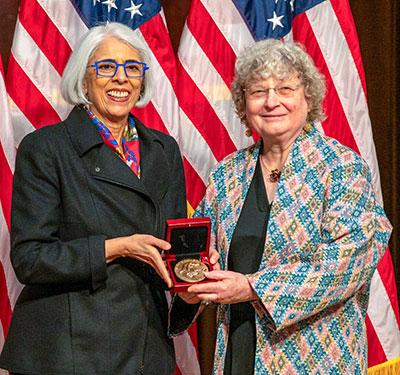
Daubechies won the Medal of Science “for pioneering discoveries in the development of wavelets,” according to her citation. “A mathematician and physicist, Ingrid Daubechies has transformed the field of signal processing and the way society consumes, utilizes and optimizes digital images and information, from art to smartphones and MRI machines. A trailblazer and a role model, she empowers women in math and science worldwide.”
Daubechies, Princeton’s William R. Kenan, Jr. Professor of Mathematics and Applied and Computational Mathematics, Emeritus, was a member of Princeton’s faculty from 1994 to 2011, during which time she became the first female full professor in the Department of Mathematics. She is now the James B. Duke Distinguished Professor Emerita of Mathematics at Duke University.
“The astonishing range of Daubechies’ work runs from repairing old master paintings to efficient transmission of signals through the internet,” said Charles Fefferman, Princeton’s Herbert E. Jones, Jr. ’43 University Professor of Mathematics, who was at Princeton throughout Daubechies’ 17-year tenure and who chaired the math department from 1999-2002. “Most famously, one of her discoveries transformed the wavelet transform from a curiosity to a basic tool of modern technology.”
Among her many honors, Daubechies is a member of the National Academy of Sciences, the Royal Society of London, the American Mathematical Society, the Academia Europaea and the National Academy of Engineering. She has also received the Wolf Prize in Mathematics, the L’Oréal-UNESCO Award for Women in Science, the Nemmers Prize in Mathematics, the BBVA Foundation Frontiers of Knowledge Award and the Benjamin Franklin Medal in Electrical Engineering from the Franklin Institute.
Daubechies received both her bachelor’s and doctoral degrees in physics from Vrije Universiteit-Brussel, and she has six honorary doctorates.
John O. Dabiri ’01
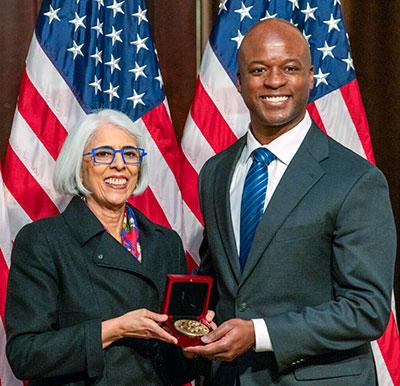
Undergraduate alumnus Dabiri received the Medal of Science “for outstanding achievements in aeronautical and biological engineering,” according to his citation. “Inspired by the movements of fish and jellyfish, John Dabiri’s work on biological fluid dynamics, turbulence and biological propulsion has advanced our clean energy future, leading to more efficient wind turbines and wind farms that make our world cleaner, safer and more sustainable for future generations.”
Dabiri, a B.S.E. graduate of the Class of 2001, is now the Centennial Chair Professor at Caltech. He is a MacArthur Fellow, a fellow of the American Physical Society and a fellow of the American Institute for Medical and Biological Engineering, as well as the recipient of the Alan T. Waterman Award from the National Science Foundation, the Presidential Early Career Award for Scientists and Engineers (PECASE) and the Office of Naval Research Young Investigator Program Award.
After completing his summa cum laude degree from Princeton’s Department of Mechanical and Aerospace Engineering, he got an M.S. in aeronautics from Caltech in 2003 and a Ph.D. in bioengineering with a minor in aeronautics from Caltech in 2005. He was a professor of aeronautics and bioengineering at Caltech from 2005 to 2015, then spent four years teaching at Stanford before returning to Caltech.
Cynthia Dwork ’79
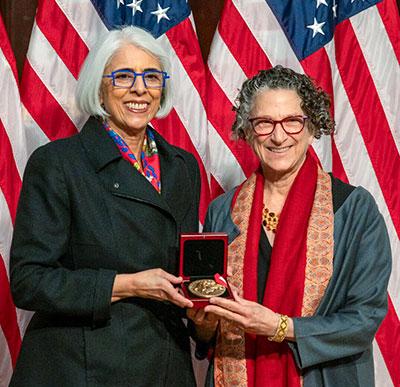
Dwork received the Medal of Science “for visionary contributions to the field of computer science and secure public key cryptography,” according to her citation. “Cynthia Dwork’s innovative research, analysis and discoveries on differential privacy, fairness and algorithms, and statistical validity and adaptive data analysis help guide cutting-edge technologies across modern societies and play a critical role in advancing the global public good.”
Dwork is a member of the National Academy of Sciences and the National Academy of Engineering, as well as a fellow of the American Academy of Arts and Sciences, the American Philosophical Society and the Association for Computing Machinery (ACM). Her many awards include the Gödel Prize, the Institute of Electrical and Electronics Engineers Richard W. Hamming Medal, the ACM Paris Kanellakis Theory and Practice Award and multiple test-of-time awards.
A B.S.E. graduate of the Class of 1979, Dwork is now the Gordon McKay Professor of Computer Science at Harvard University, a Radcliffe Alumnae Professor at the Radcliffe Institute for Advanced Study and affiliated faculty at Harvard Law School.
While at Princeton, Dwork received the Charles Ira Young Award for Excellence in Independent Research. After completing her degree, she earned a Ph.D. from Cornell University in 1983.
This story originally appeared on the Princeton University website.

